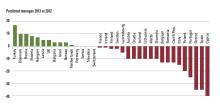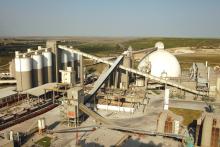In response to companies' strategies to avoid the tax on cement, the Moroccan finance law for 2015 will alter the modalities of the tax so that it is imposed on cement production rather than on cement sales.
This comes after cement groups opted to absorb their concrete subsidiaries to avoid the tax, resulting in a loss in revenue for the treasury from the tax on cement used for concrete production.
Sales of cement to subsidiaries represent approximately 16% of total cement production, proportional to the taxation revenue lost by the treasury.
Alongside part of the revenue from the tax on sand and the tax on reinforced concrete, this cement tax is designed to finance the housing solidarity fund, for which the 2013 revenue stood at MAD 2.3 billion (€210.53 million/US$249.06 million), up 6.54% from the previous year.
Some 60 programmes designed to fight inadequate housing will be carried out in 2015 at a cost of MAD 6.2 billion. As at the end of November, 2014, some 12.76 million tonnes of cement had been sold, down 6% from 13.57 million a year earlier.






